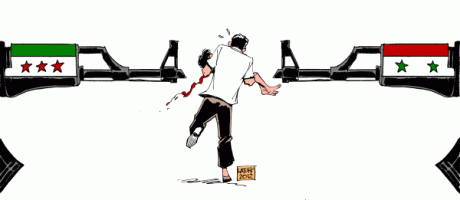News
You are here
Syrian revolution continues to face external and internal threats

February 1, 2013
The violence in Syria is escalating as the uprising marks the end of its second year with more than 60,000 killed. As the West continues its indirect intervention--intially through Saudi Arabia and Qatar and now through Israel--some opposition forces continue attempts to contain the revolution against Assad.
Indirect Western intervention
The Syrian uprising began by peaceful protests in several cities and villages. The lack of mass strikes like in Tunisia and Egypt, combined with the regime's brutal military assaults, caused the Syrian revolution to rely more on arms--and it provoked defections in the military with the creation of the Free Syrian Army (FSA). Unlike Libya, the West has not had the confidence to intervene directly in the Syrian conflict. Though it has raised the threat of "no-fly zones" (an excuse for war), and failed in its proposed "peace plan" that would preserve the Assad regime, the main tactic of Western intervention has been indirect through its allies Saudi Arabia and Qatar, which have been supplying sections of the FSA rebels with arms. Western indirect intervention turned the conflicts between the rebels and the regime’s forces into a civil war that hijacked the revolution.
Now, as the conflicts between the regime's forces and militant rebels continue, another Western-armed state entered the scene, raising risks of direct military intervention. In an official statement, the Syrian government said that Israeli warplanes carried out an airstrike inside its territories on Wednesday, January 30. Israel kept silent over the attack, but the Syrian government statement said: “Israeli warplanes violated our airspace at dawn, bombing directly one of the research scientific centers in Jimraya district in rural Damascus.” This might increase the risk of escalating violence with the current civil war that has claimed thousands of lives.
National dialogue?
On the other hand, some opposition forces have been trying to contain the revolution. Moaz AlKhatib, the president of the National Coalition for Syrian Revolutionary and Opposition Forces said on Wednesday, January 30 that he is open to talks with officials of Assad’s regime on two conditions: that they release thousands of detainees, and issue new passports for Syrians whose documents had expired. This provoked an outcry that compelled him to say that he was just expressing his opinion. His call for dialogue has revealed divisions in the Syrian opposition. According to Reuters, an opposition source said that “the knives were out for AlKhatib” from other opposition figures and members of the National Council. The Syrian government officials said that certain opposition figures could return to Damascus for dialogue without facing charges.
Revolution: the only viable option
While urgent humanitarian assistance is needed to Syrians who are either trapped in conflict zones, displaced or taking refuge, neither foreign military intervention not comprise with the regime will end the crisis. The only solution is to continue the social and economic demands and methods of the revolution, through mass strikes and protests, while people outside Syria stop their own governments from hijacking the revolution.
Section:










